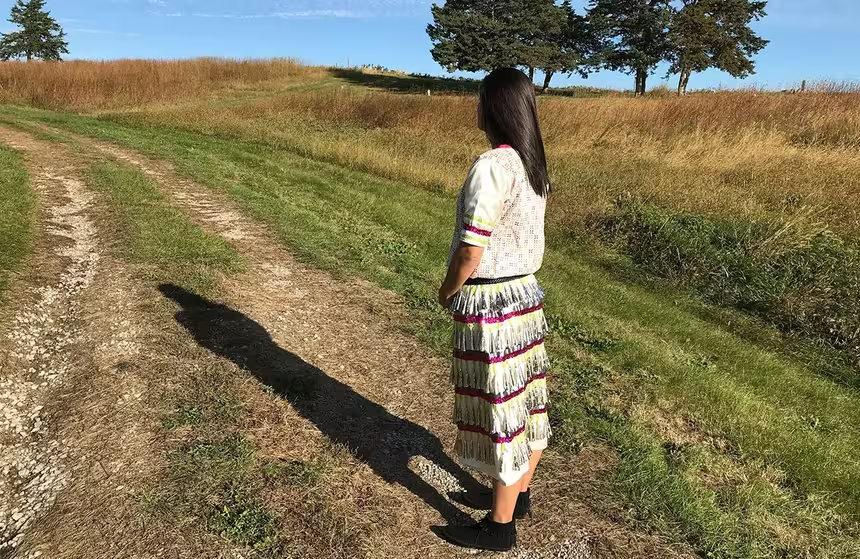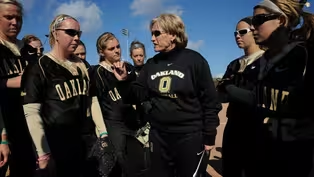
Portraits of Humanity
Clip: Season 14 Episode 12 | 8m 56sVideo has Closed Captions
Capturing the essence of humanity
Art and medicine are inextricably linked for Scottish-born artist Mark Gilbert, who creates portraits in the realm of medical humanities. Mark’s recent work raises questions associated with the uncertainties, confusion and isolation associated with dementia for both patient and caregiver, while simultaneously offering glimpses into the healing aspects of art.
Problems playing video? | Closed Captioning Feedback
Problems playing video? | Closed Captioning Feedback
Nebraska Stories is a local public television program presented by Nebraska Public Media

Portraits of Humanity
Clip: Season 14 Episode 12 | 8m 56sVideo has Closed Captions
Art and medicine are inextricably linked for Scottish-born artist Mark Gilbert, who creates portraits in the realm of medical humanities. Mark’s recent work raises questions associated with the uncertainties, confusion and isolation associated with dementia for both patient and caregiver, while simultaneously offering glimpses into the healing aspects of art.
Problems playing video? | Closed Captioning Feedback
How to Watch Nebraska Stories
Nebraska Stories is available to stream on pbs.org and the free PBS App, available on iPhone, Apple TV, Android TV, Android smartphones, Amazon Fire TV, Amazon Fire Tablet, Roku, Samsung Smart TV, and Vizio.

Do you have a Nebraska Story?
Do you have a story that you think should be told on Nebraska Stories? Send an email with your story idea, your name, your city and an email address and/or phone number to nebraskastories@nebraskapublicmedia.org. Or, click the link below and submit your information on nebraskastories.org.Providing Support for PBS.org
Learn Moreabout PBS online sponsorship(charcoal rubbing) [Mark] I don't worry about things like precision.
(soft ominous music) What I'm trying to do is to make sure that every mark I make is a direct and honest response to who's in front of me.
(soft ominous music) Each mark is also, not just drawing what I see which is fundamental, (soft ominous music) but it's also to a certain extent drawing what I'm experiencing, what I'm feeling.
(soft ominous music) [Narrator] There's a symmetry in the journey of Scottish artist, Mark Gilbert.
(gentle music) Nearly 20 years ago, Mark passed through Omaha with an international tour of his landmark exhibition "Saving Faces".
(gentle music) Which featured arresting portraits of patients before, during, and after dramatic and sometimes disfiguring facial surgeries.
(gentle music) [Mark] To be showing in this space, (gentle music) especially in this space.
'Cause this is where it all started with me, in Omaha.
So I'd never been here before and so so it's lovely to be back here.
(gentle music) [Narrator] Now Mark is a professor of medical humanities at the University of Nebraska at Omaha where the first exhibit took place.
(gentle music) Still an artist.
He continues to do portraiture.
(gentle music) This work is part of a study exploring the experiences of frontline healthcare workers across the country.
(charcoal rubbing) [Mark] I often talk about the sort of vulnerability that it is in both sides of the easel.
When you're working on these portraits.
(gentle music) I've worked with people who know that they're in the last weeks of their life.
I've worked with people who are caring for people who they know are terminally ill and so on.
(gentle music) And I've never worked with people who are so, that their emotions were so on the surface and so raw (gentle music) that they broke down in a way that had never happened (gentle music) with anybody else I've ever worked with in the last 20 years.
(gentle music) You know, they were working crazy hours.
They were working with huge uncertainties about the care that they were able to deliver for the patients they were working with.
About their own wellbeing.
(gentle music) About when is this going to end?
About am I going to infect the people I care for, my family, my children?
(gentle music) [Narrator] Mark has probably had a dozen sessions with nurse practitioner, Sarah Lane during the past few years.
Even during the height of the Covid Pandemic.
[Sarah] And I remember after my first meeting with Mark we talked about a lot of things that I hadn't ever really maybe like tapped into.
And so I remember going home and just like being like exhausted.
(gentle music) It brought on so many emotions of just overall sadness for the patients and, you know, my coworkers and the struggle that, you know, we were all having.
(gentle music) That's what really prompted a lot of the, you know why I continued to come back because I just knew that this was important.
(gentle music) People will ask me about it and I can't really answer it.
Like in my head, I know, you know, what it was about and what it did for me but it's hard to share that with other people to put it to words.
(gentle music) [Mark] But I'm not an art therapist.
I don't do these pictures to make people feel better (gentle music) but often it does.
So, and when that happens, we recognize that and record it.
And I'm pleased.
[Narrator] Even in silence, there can be a therapeutic dialogue.
(gentle music) As Gilbert's most recent exhibit involving dementia patients in Halifax, Nova Scotia, reveals.
(gentle music) It took me years to properly recognize this that that silence isn't an empty void.
There's a huge amount of communication that happens in that silence.
There's a huge amount of expression.
(gentle music) Either, you know, with us both looking at each other (gentle music) and the drawing facilitates that facilitates the relationship building.
(gentle music) When we think about people with dementia, sometimes we end up thinking that they've, kind of lost so much that they have nothing left to give.
(gentle music) That they've lost the capacity to be productive or to be purposeful.
But hopefully the exhibition is able to allow people to really engage and be maybe even reengage with that notion that people who are living with dementia still have an amazing sense of personhood.
There are still are things that nourish them.
There are still things that bring joy.
(gentle music) [Narrator] Every frame is a window into a deeply private world.
(gentle music) [Dr Kelly] We don't often see this depicted in art.
(gentle music) You know, that there's a veil across that chapter of life that I think that your work helps to lift.
(gentle music) [Narrator] Gerontology professor Dr. Chris Kelly says, "The lives of older adults are often overlooked."
(gentle music) [Dr Kelly] Our last days were spent among family and friends.
Those who are closest to us.
(gentle music) The rest of the world is kind of outside of that veil.
What Mark has done with this exhibit has pulled back that veil and to show us the beauty of life in that penultimate chapter.
And to have a better understanding of just what individuals are going through.
(gentle music) The feelings, the fears, (gentle music) the many emotions that they are experiencing.
(gentle music) Art and literature and music and everything that the creative world is about is a part of our lives from our earliest memory to our last moments on Earth.
(gentle music) That lifelong education doesn't stop.
And, I think that for the subjects of Mark's paintings, I think that they were aware that they are, they were participating in something incredible, that they're participating in the education and the understanding of people of all ages, about what it means to be human.
(gentle music) (gentle music) [Mark] So this was a piece, yeah, so it was done in 1992.
And so it's just kind of typical of the kind of drawings that my dad would do.
You know, prior to every single painting that he did, he always did a series and we all had to sit for him.
You know, I had to pose from him.
[Narrator] Mark's own mom, had Alzheimer's and died of a stroke before this project began.
(gentle music) [Mark] It's called "The Chair" but I think, I always call it "The Empty Chair".
So it is the empty chair, it's the chair my mum sat in.
So again, it's that testament to bereavement and to loss.
(gentle music) [Narrator] This is the first time Mark's work has hung side by side with his dads.
Both of his parents were artists.
They met at the Glasgow School of Art in the 1950s.
It wasn't unusual for him to be sitting for me in the morning, and I'd be sitting for him in the afternoon, this is when I was, we were in Glasgow.
So these pictures are kind of unique in as much the picture my mum on her own.
(gentle music) [Narrator] When Mark's mom, Pat, was in her final days, his father Norman made these drawings of her.
(gentle music) [Mark] I was staggered that he was doing them.
Frightened to look at them, you know, I didn't wanna look at them.
(gentle music) And I remember he asked me about two or three times, "Do you wanna see them?"
And I said, "No, not yet."
And then when I saw them, I loved them.
You know, I, and again, it kind of forced me to come from behind the easel, you know?
So I kinda was almost like I became like one of my participants.
Those pictures sort of present some of the most traumatic times of my life and I love them.
(gentle music) [Narrator] Norman passed a few years after his wife Pat, and never had the chance to see these works displayed together.
(gentle music) But the drawings serve another purpose to soften the medical gaze and invite new understandings of the deeply isolated worlds of dementia, death, and dying.
(gentle music) The meaning of the pictures doesn't reside with my dad or with my mum.
Or with the, you know, with the people in these pictures.
You know, the meaning's constantly in flux.
And so that you know the audience, you know bring their own meanings bring their own experience to the pictures.
(gentle music) For me as a son, (gentle music) they've taught me more about the healing power of art than anything else I've ever experienced.
(gentle music) (gentle music)
Video has Closed Captions
Clip: S14 Ep12 | 11m 28s | Her coaching strategy included advancing equity for her players. (11m 28s)
Providing Support for PBS.org
Learn Moreabout PBS online sponsorshipSupport for PBS provided by:
Nebraska Stories is a local public television program presented by Nebraska Public Media
















